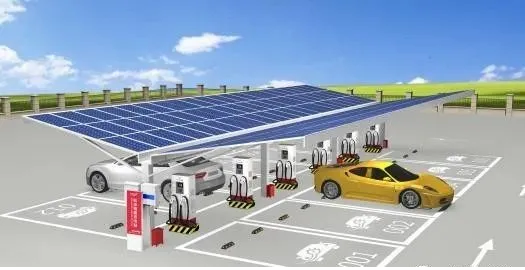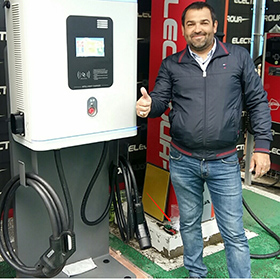According to the Implementation Plan for Accelerating the Development of New Energy Vehicle Industry in Shanghai (2021-2025) released by the Shanghai Municipal People's Government, by 2025, the proportion of pure electric vehicles among new vehicles purchased by individuals in Shanghai will exceed 50%, and new energy vehicles will be fully used in public transport vehicles and cruising taxis.

On the morning of May 25, Yu Fulin, director of the Shanghai Municipal Commission of Transport, was a guest on Shanghai People's Radio's "2021 Shanghai People's Livelihood Interview" and said that 10,000 new public charging stations and 15 new taxi charging demonstration stations will be added during the year 2021 to meet the growing charging needs of the public. The project has also been included in Shanghai's practical projects for the people in 2021. Shanghai is also studying the pilot project of "slow to fast" charging piles. Recently, the city's Transport Commission is organising a study on the conversion programme, considering making full use of the existing power capacity of slow-charging piles at each site, and building additional DC fast-charging piles by sharing power capacity at some of the eligible sites.
Shanghai Model of Charging and Switching
In 2020, Shanghai will launch the first batch of 21 charging demonstration stations for rental cars, of which 15 have been completed and put into operation, and 6 are still under construction and commissioning. 2021 will see the launch of 24 new demonstration stations, of which 6 have been completed and the remaining 18 will be built by the end of the year. With the completion of all demonstration stations, Shanghai will have completed the original task of building 45 charging demonstration stations in three years, one year ahead of schedule.
As for the construction of public dedicated charging piles, as of the end of March 2021, the municipal platform has accessed a total of 112,400 public and dedicated charging facilities, and more than 400,000 ev charging stations of various types within the community and so on.
"Shanghai encourages the development of the taxi-for-electricity model." Yu Fulin, director of the Shanghai Municipal Commission of Transport, introduced that in March 2021, SAIC Group released the first Rongwei Ei5 taxi-for-electricity model, and Shanghai thus began a pilot application of a taxi-for-electricity vehicle. In addition to being able to change the electricity, the power exchange model also requires the retention of a fast-charging interface, making it easy for drivers to choose their own charging and changing modes. Up to now, Shanghai has 12 power exchange stations have been put into operation.
In addition to the charging and swapping direction, Shanghai is also about to undertake the construction of a hydrogen energy test base.
The Shanghai model of fuel cells
Recently, the WeChat platform of the People's Government of Shanghai Jiading District released news that a new development has come from the Jiading Hydrogen Energy Port project - Shanghai Hydrogen Energy and Fuel Cell Testing Centre: the project has entered the preparation stage of public bidding, and construction is planned to start at the end of July this year and be completed by the end of 2022. When completed, the base will be the first public service platform for hydrogen energy third-party testing and R&D covering system technologies such as fuel cell reactors, engines and key components in Shanghai.
The project will cover an area of 49.6 mu and will provide more than ten types of laboratories, including vehicle performance testing, fuel cell engine performance testing, fuel cell reactor performance testing, hydrogen supply, air supply, cooling system testing and other testing environments, as well as a 35MPa/70MPa dual-function hydrogen refuelling facility to supply hydrogen for the laboratory and for the vehicles to be tested. supply hydrogen to the laboratory and to refill the vehicles to be tested.
When completed, the Shanghai Hydrogen and Fuel Cell Testing Centre will provide services to fuel cell vehicle manufacturers, automotive component R&D and manufacturing enterprises and research institutes, hydrogen energy infrastructure (including hydrogen refuelling stations) construction and operation units and other suppliers of hydrogen fuel cell related products.
Currently, hydrogen energy as a zero-carbon energy source is receiving higher and higher attention, and is even regarded by some industry insiders as the ultimate solution for human energy. 21 September 2020, five departments, including the Ministry of Finance and the Development and Reform Commission, jointly issued the Notice on the Demonstration and Promotion of Hydrogen Fuel Cell Vehicles (the Notice), which also further affirms and encourages the development of hydrogen fuel cell vehicles.
According to the data published in the "14th Five-Year Plan" Hydrogen Energy Industry Development Forum held by the China Hydrogen Energy Alliance, by the end of 2020, there will be about 544 hydrogen refuelling stations in the world, 128 hydrogen refuelling stations have been built in China, and the cumulative number of hydrogen fuel cell vehicles has reached more than 7,000.
The Shanghai model of new infrastructure
The new infrastructure is different from the traditional one, which relies on the government's financial input, and the market force is the first driver. Among the new infrastructure projects being promoted in Shanghai, the charging piles are precisely the most obvious type of market-oriented features.
The first batch of charging piles in Shanghai were invested and laid out by enterprises under the State Grid Shanghai Electric Power Company. After the state capital opened up the situation, all kinds of market players came in droves to build piles, set up stations and lay the network ...... to explore the business model to become stronger and bigger.
The market-led infrastructure will naturally shuffle itself and eliminate the best in accordance with the laws of the market. Today, there are about ten head companies left to invest in building and operating charging piles in Shanghai. These include large enterprises such as electric power companies and Teco, which specialise in the installation of charging piles; related enterprises from new energy vehicles and components; and platform enterprises that are not involved in production investment but only in charging pile management and operation.
Shanghai already plans to build 15 demonstration stations per year in 2020, which was successfully completed last year. This year, in addition to the 15 demonstration stations, 10 shared charging pile demonstration communities will be built. These large-scale demonstration stations are an important vehicle for the "new infrastructure upgrade" of Shanghai's charging piles.
In addition to building large-scale demonstration stations, Shanghai is also using a guiding and pushing approach to promote the quality of the city's charging piles. All charging piles in the city will be included in a unified assessment system, and government departments will "star-rate" public charging piles according to their level of service, so that companies can be given corresponding subsidies in different grades.
In recent years, the government and enterprises in Shanghai have worked closely together to provide a wide range of charging piles from institutions, shopping malls and hotels, public car parks to the doorsteps of communities, greatly improving the travel experience of new energy vehicle consumers. The ratio of vehicles to piles has now reached 1.2:1, and a two-kilometre fast-charging service circle in urban areas has been built and continues to be expanded.
From the various measures taken this year, Shanghai's new energy infrastructure is breaking out in multiple directions and construction is in full swing. Smart charging piles and shared charging piles form the backbone of its positive interaction circle of people, vehicles and power grids, which, coupled with continued investment in hydrogen and fuel cells, makes Shanghai one of the main fronts for new energy vehicles to make a landing.
Luoyang Grasen Power Technology Co., Ltd is a professional AC home charger and DC fast charger EV supercharger manufacturer for 11 years in China, the charging connectors can be any two of CCS1/CCS2/CHAdeMO/GBT. Please enter our website for more information: https://www.grasen.com. Please send email to sales@grasen.com for inquiry.

-- Marcus Groll,A Charging Station Owner in UKRAINE
Start your EV charging station businesses with Grasen. For a no-obligation quote, hit the button below, fill in your details, and we’ll get back to you.
